Table of Contents
Get started with MyPerfectResume today!
- Build a resume on any device
- Pick an ATS-friendly template
- Tailor with AI copy suggestions
Why this resume works
- Highlights industry-specific skills: The applicant’s experience in emissions reduction and resource management highlights industry-specific skills essential for roles focused on sustainability and environmental impact.
- Quantifies accomplishments: Using concrete figures like reducing emissions by 15% and waste by 20%, the applicant’s resume accomplishments clearly illustrate their tangible environmental contributions.
- Showcases career progression: Progressing from an analyst to a scientist role, the applicant showcases increased responsibility, leading projects and managing teams in diverse environmental initiatives.
More Environmental Science Resume Examples
Review our environmental science resume examples to see how to showcase your fieldwork expertise, research skills, and sustainability efforts. These samples help you create a resume that highlights your impact in environmental roles.
Entry-Level Environmental Science
Why this resume works
- Centers on academic background: The applicant’s education section emphasizes a Master’s degree in environmental science as a strong foundation for early-career achievements.
- Effective use of keywords: Skills like environmental impact assessment and regulatory compliance are seamlessly integrated, ensuring alignment with keywords to improve ATS compatibility for targeted job roles.
- Shows digital literacy: Referencing tools such as GIS and data reporting platforms, the applicant showcases practical computer skills essential for modern environmental analysis and compliance workflows.
Mid-Level Environmental Science
Why this resume works
- Points to measurable outcomes: Showcasing a 30% reduction in waste and $50k annual savings clearly points to the applicant’s ability to drive measurable outcomes through innovative methodologies.
- Demonstrates language abilities: The applicant’s language skills improves cross-cultural communication capabilities, important for international projects.
- Displays technical expertise: Proficient in GIS mapping and LEED principles, the applicant displays technical expertise essential for environmental assessment and sustainable planning.
Experienced Environmental Science
Why this resume works
- Showcases impressive accomplishments: Through initiatives like a $1M grant and a 20% emission cut, the applicant’s accomplishments reflect significant business impact.
- Focuses on work history: The applicant effectively highlight extensive career experience, showcasing steady growth from environmental researcher to scientist.
- Emphasizes leadership skills: Demonstrating strong leadership skills, the applicant led teams on renewable projects and trained over 50 staff in compliance.
Environmental Science Resume Template (Text Version)
Chris Singh
Chicago, IL 60609
(555)555-5555
Chris.Singh@example.com
Professional Summary
Experienced Environmental Scientist with over 8 years in reducing emissions, sustainable development, and resource management. Skilled in environmental impact assessments and leading successful green initiatives.
Work History
Environmental Scientist
Green Earth Solutions – Chicago, IL
July 2021 – July 2025
- Led project reducing emissions by 15%
- Conducted environmental impact assessments
- Managed team of 10 on water conservation projects
Environmental Consultant
EcoTech Advisory – Springfield, IL
July 2017 – June 2021
- Reduced waste by 20% through sustainable practices
- Provided training sessions on green technologies
- Developed strategies for resource management
Environmental Analyst
EcoGuard Environments – Springfield, IL
July 2015 – June 2017
- Analyzed data reducing pollution by 10%
- Monitored compliance with environmental laws
- Conducted biodiversity surveys
Languages
- Spanish – Beginner (A1)
- French – Intermediate (B1)
- German – Beginner (A1)
Skills
- Environmental impact assessment
- Sustainable development
- Data analysis
- Project management
- Resource management
- GIS mapping
- Biodiversity conservation
- Regulatory compliance
Certifications
- Certified Environmental Professional – National Association of Environmental Professionals
- LEED Green Associate – U.S. Green Building Council
Education
Master of Science Environmental Science
University of California, Berkeley Berkeley, California
June 2015
Bachelor of Science Environmental Studies
University of California, Los Angeles Los Angeles, California
June 2013
Related Resume Guides
- Aviation
- Banking
- Billing And Collections
- Biology
- Boating
- Business Operations
- Casino
- Chemistry
- Child Care
- Civil Engineering
- Compliance
- Computer Hardware
- Computer Software
- Construction
- Copywriting
- Cosmetology
- Costco
- Culinary
- Customer Service
- Dance
- Data Systems Administration
- Deloitte
- Dentistry
- Driving
- Education
- Electrical
- Electrical Engineering
- Energy
- Engineering
- Entertainment
- Entrepreneur
- Entry Level
- Environmental
- Event Planning
- Executive
- Fashion
- Film
- Finance
- Fitness And Nutrition
- Food Service
- Freelancing
- General Laborer
- Goldman Sachs
- Government
- Graphic Design
- Healthcare Support
- Hospitality
- Human Resources
- HVAC
- Industrial Engineering
- Information Technology
- Insurance
- Interior Design
- Inventory Management
- Janitorial
- Landscaping
- Language Services
- Law
- Law Enforcement
- Library
- Logistics
- Maintenance
- Marketing
- McKinsey
- Mechanical Engineering
- Mechanics
- Media And Communication
- Medical
- Mental Health
- Meta
- Metal Work
- Military
- Mining
- Museum
- Music
- Netflix
- Non Profit
- Nursing
- Pharmaceutical
- Photography
- Physical Therapy
- Plumbing
- Politics
- Production
- Program Manager
- Project Manager
- Psychology
- Purchasing
- Quality Control
- Real Estate
- Religion
- Retail
- Safety And Security
- Sales
- Sciences
- Shipping
- Social Services
- Special Education
- Sports
- Statistics
- Student
- Teaching
- Team Lead
- Tesla
- Training And Development
- Transportation
- Travel
- Veterinary
- Walgreens
- Walmart
- Web Development
Advice for Writing Your Environmental Science Resume
Discover our tailored advice on how to write a resume for an environmental science role and learn how to highlight your passion for sustainability, your hands-on experience with ecological projects, and your ability to drive positive change.
Highlight relevant technical skills
Technical skills are a big part of an environmental science role. These technical skills help you analyze data, conduct research, and solve problems related to the environment.
It’s important to either create a technical skills section on your resume or weave these skills into your work experience if they are part of what you’ve done before. This makes it clear to employers that you have the hands-on knowledge needed for the job.
For an environmental science position, there are specific technical skills that employers often look for. These might include GIS (geographic information systems) for mapping and analyzing geographical data, statistical analysis software like R or SPSS for handling complex datasets, and field sampling techniques for collecting soil, water, or air samples.
When listing technical skills, be sure to focus on those most relevant to environmental science tasks. Tailor your resume by including examples of how you’ve used these skills in past jobs, internships, or projects. This helps show potential employers that you’re ready to tackle the challenges they’ll present in this field.
Example of a technical skills section
- Geographic information systems (GIS) using ArcGIS and QGIS
- Remote sensing data analysis
- Environmental impact assessments (EIA)
- Data modeling with R and Python
- Field sampling techniques for soil, water, and air testing
- Environmental compliance and regulatory reporting
- Hydrological and atmospheric modeling tools
- Biodiversity assessment tools
- Sustainable development practices
Employers love seeing soft skills like teamwork, communication, and leadership on a resume. Use a Resume Builder to show how you used these skills to succeed in past jobs!
Quantify your accomplishments
Quantifying your accomplishments in a resume makes it more compelling because it shows what you’ve achieved rather than just listing what you did. In the work experience section, each entry should include your job title, employer name, location, and employment dates.
For an environmental science role, instead of saying “conducted research,” you could say “conducted a study that reduced water waste by 20%.” This turns a duty into an achievement with measurable results.
Using action verbs and metrics helps create a results-driven resume. For example, stating that you “led a team to improve recycling efficiency by 30%” is much stronger than simply saying “managed recycling efforts.” This approach allows hiring managers to quickly see the impact you’ve made and the skills you bring to the table.
By focusing on quantified accomplishments, you make it easier for employers to understand how you can contribute effectively to their organization in the field of environmental science.
5 environmental science work history bullet points
- Conducted water quality testing across 15 sites, leading to a 25% improvement in contamination reporting accuracy.
- Developed and implemented waste reduction strategies that decreased landfill contributions by 12% over one year.
- Led a community outreach program educating 200+ residents on sustainable practices, increasing recycling participation by 30%.
- Analyzed air pollution data using GIS tools, identifying trends that informed policy changes reducing emissions by 8%.
- Managed habitat restoration projects across 50 acres, boosting biodiversity levels and protecting endangered species.
Need help with your resume? Check out these professional resume examples to get ideas and build a great resume for your next job.
Write a powerful professional summary
A professional summary is a brief intro at the top of your resume that helps hiring managers quickly get to know you. It’s like a snapshot of who you are as a worker.
A professional summary is typically three to four sentences long and showcases your experience, skills, and achievements. It’s ideal for those with some work experience. This section aims to reveal your professional identity and the value you offer in environmental science roles.
Conversely, a resume objective focuses on what you want to accomplish in your career. It’s more like declaring, “Here’s what I aim to contribute.” Objectives work well for newcomers, career changers, or those with gaps in their job history. Simply put, summaries emphasize “what I’ve accomplished,” while objectives highlight “what I aim to contribute.”
Next up, let’s explore examples of both summaries and objectives across experience levels.
Environmental science resume summary examples
Entry-level
Recent environmental science graduate with a Bachelor of Science degree, equipped with strong knowledge in ecological research and environmental policy analysis. Completed internships focused on water quality testing and waste management. Proficient in GIS mapping and data analysis tools, with a commitment to promoting sustainable practices and environmental conservation.
Mid-career
Environmental scientist with over five years of experience conducting field studies, managing environmental impact assessments, and collaborating on renewable energy projects. Skilled in regulatory compliance, habitat restoration planning, and stakeholder engagement. Known for delivering actionable insights through detailed reporting and data visualization using tools like ArcGIS and Python.
Experienced
Senior environmental scientist with expertise in climate change adaptation strategies and natural resource management. Over a decade of leadership experience overseeing cross-functional teams in complex environmental remediation projects. Advanced certifications include Certified Environmental Professional (CEP) and LEED AP. Proven track record of driving sustainable development initiatives that balance ecological preservation with economic growth.
Environmental science resume objective examples
Recent graduate
Driven and detail-oriented recent environmental science graduate with a Bachelor of Science in environmental studies, seeking an entry-level role to apply academic knowledge of ecosystem management and sustainability practices. Committed to contributing to conservation efforts and supporting initiatives that promote environmental health.
Career changer
Passionate professional transitioning into the field of environmental science after gaining experience in project coordination and data analysis within the tech industry. Excited to use transferable skills such as research, strategic planning, and collaboration to address environmental challenges and support sustainable development goals.
Specialized training
Recent graduate with specialized coursework in climate change mitigation and renewable energy systems seeking an opportunity to join an organization focused on innovative solutions for a sustainable future. Aspires to integrate academic training with hands-on projects that advance clean energy initiatives while protecting natural resources.
Pick a resume template that is clean and easy to read. Use bold headings, simple fonts, and avoid too many designs or pictures so your skills and experience stand out clearly.
Showcase your credentials
In environmental science, listing your credentials is key. Certifications, licenses, and training show that you have the skills needed for the job. This is especially true in technical fields where specific knowledge can make a big difference.
Make sure to create a certifications section on your resume. This section should be right next to your education details so employers see all your qualifications at once.
- Certified Environmental Professional (CEP)
- LEED Accredited Professional
- Registered Environmental Manager (REM)
- Certified Hazardous Materials Manager (CHMM)
- Associate Safety Professional (ASP)
Having certifications in environmental science shows that you’re serious about your career and willing to go the extra mile. They also help you stand out from others who may not have taken these steps. These credentials prove that you are ready and able to handle the challenges of the job.
Example of a certifications section
Certified Environmental Scientist (CES)
Issued by: National Registry of Environmental Professionals (NREP)
Issued 2021
LEED Green Associate
Issued by: U.S. Green Building Council
Expires 2025
Environmental Impact Assessment Certification
Issued by: International Association for Impact Assessment (IAIA)
Issued 2022
ISO 14001 Internal Auditor Certification
Issued by: International Organization for Standardization (ISO)
Issued 2023
Hazardous Waste Operations and Emergency Response (HAZWOPER) Certification
Issued by: Occupational Safety and Health Administration (OSHA)
Expires 2026
Pick a resume template that is clean and easy to read. Use bold headings, simple fonts, and avoid too many designs or pictures so your skills and experience stand out clearly.
Salary Insights for Environmental Sciences
Knowing about salary trends helps you make smart choices about your career path.
Top 10 highest-paying states for environmental sciences
Environmental Sciences earn varying salaries across the United States, with a national average of $73,426. The table below highlights the states where environmental sciences command the highest compensation.
Our salary information comes from the U.S. Bureau of Labor Statistics’ Occupational Employment and Wage Statistics survey. This official government data provides the most comprehensive and reliable salary information for writers across all 50 states and the District of Columbia. The figures presented here reflect the May 2025 dataset, which is the most recent available as of this publication.
| State | Average Salary |
|---|---|
| California | $124,540 |
| Oklahoma | $120,670 |
| Michigan | $116,170 |
| Maryland | $116,130 |
| New York | $114,310 |
| Kentucky | $113,500 |
| Virginia | $112,300 |
| Montana | $110,060 |
| Massachusetts | $109,130 |
| Washington | $108,320 |
FAQ
Do I need to include a cover letter with my environmental science resume?
Yes, including a cover letter with your environmental science resume can definitely improve your application.
A cover letter offers the chance to highlight your passion for environmental issues and the specific role you’re applying for, while detailing experiences that align with the organization’s mission.
For instance, if the company is focused on renewable energy or conservation projects, you can discuss any relevant coursework, research, or volunteer work you’ve done in those areas.
Consider using tools like our Cover Letter Generator to craft a personalized letter that complements your resume and emphasizes your strengths effectively.
Additionally, exploring a library of cover letter examples tailored to environmental science positions may provide valuable inspiration and guidance.
How long should a environmental science’s resume be?
For an environmental science role, aim for a concise one-page resume that highlights core skills like data analysis, field research experience, and understanding of environmental regulations.
If you have extensive experience or specialized certifications, extending to a two-page resume can be appropriate. Ensure every detail shows your expertise in environmental science by focusing on recent roles and achievements.
Tailor your resume to fit the specific requirements of positions you’re targeting, emphasizing accomplishments that impact sustainability or conservation efforts.
Check out our guide on how long a resume should be for tips on determining the ideal length for your career stage.
How do you write a environmental science resume with no experience?
If you lack experience in environmental science, focus your resume on your education, skills, and any related activities or coursework that demonstrate your enthusiasm for the field. For guidance, check out these tips for writing a resume with no experience:
- Emphasize education: List your degree in environmental science or related fields first. Include the name of your school, graduation date, and any honors or relevant coursework like ecology, conservation biology, or environmental policy.
- Include internships and projects: Highlight any internships, research projects, or class assignments that involved environmental science concepts. Describe what you did and the outcomes to show practical application of your knowledge.
- Showcase volunteer work: If you volunteered with organizations focused on environmental causes, make sure to include this experience. Detail activities like habitat restoration, community clean-ups, or educational outreach programs.
- Highlight relevant skills: Emphasize skills such as data analysis, GIS mapping, fieldwork techniques, report writing, and skill with software used in environmental studies.
Rate this article
Environmental Science
Share this page
Additional Resources

Science CV Examples & Templates
The sciences industry encompasses a vast array of fields dedicated to the study and exploration of the natural world, ranging from biology and chemistry to physics and environmental science. It
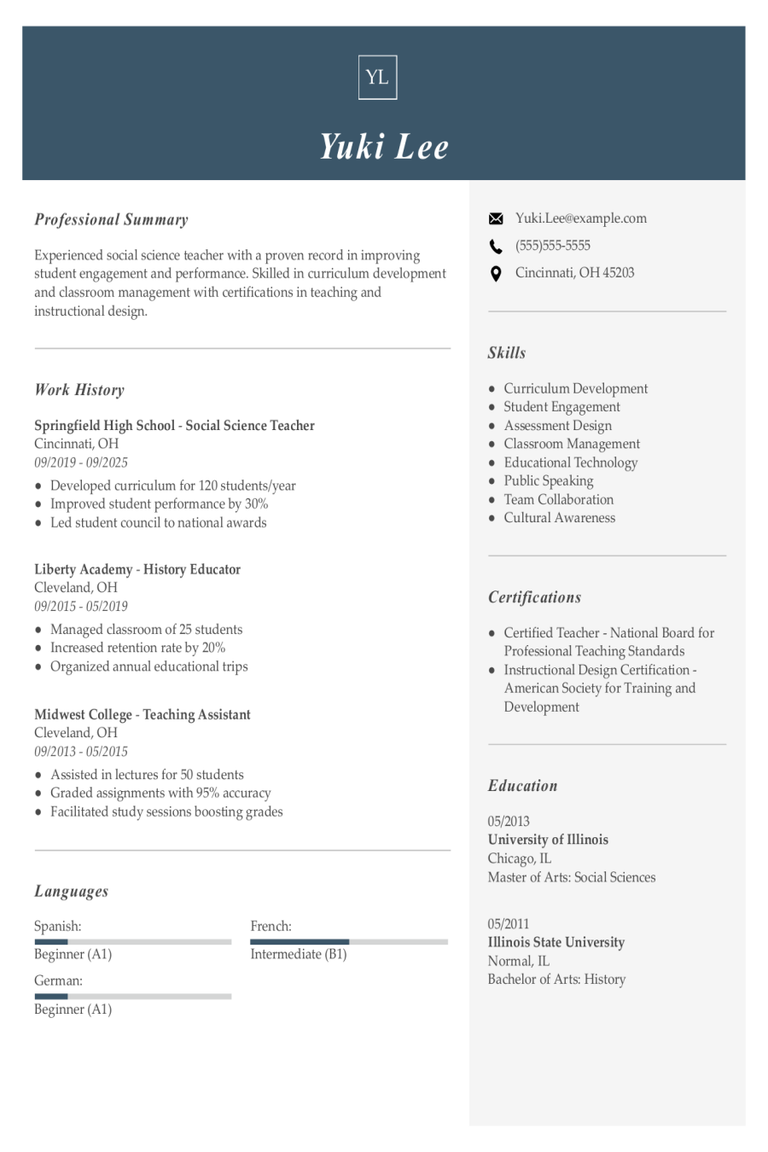
Social Science Teacher Resume Examples & Templates
Discover how social science teachers can showcase their classroom expertise and ability to engage students. These resume examples and tips will help you highlight your lesson planning skills and experience
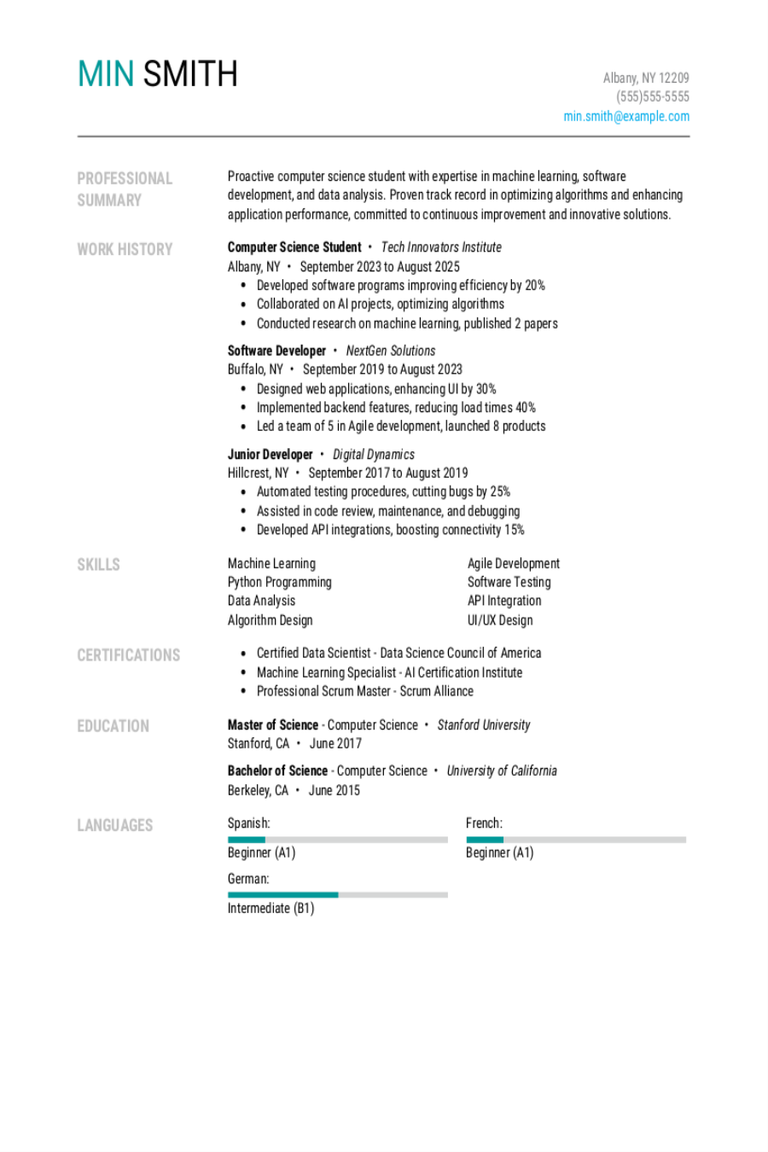
Computer Science Student Resume Examples & Templates
As a computer science student, your resume must spotlight your coding skills, school projects, and internships. Use our samples to help you build a strong resume that makes your tech
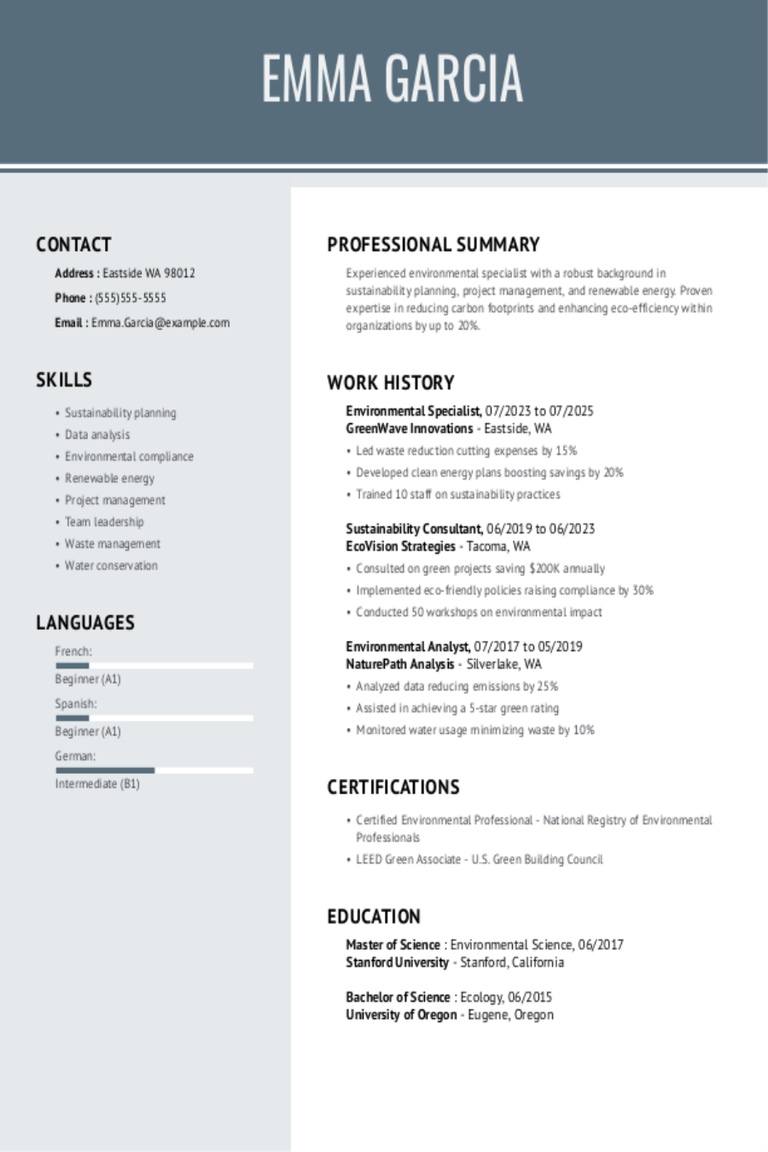
Environmental Resume Examples & Templates
Explore environmental resume examples that show how to highlight your experience with conservation, sustainability projects, and resource management. Browse tips on creating a resume that reflects your skills in protecting
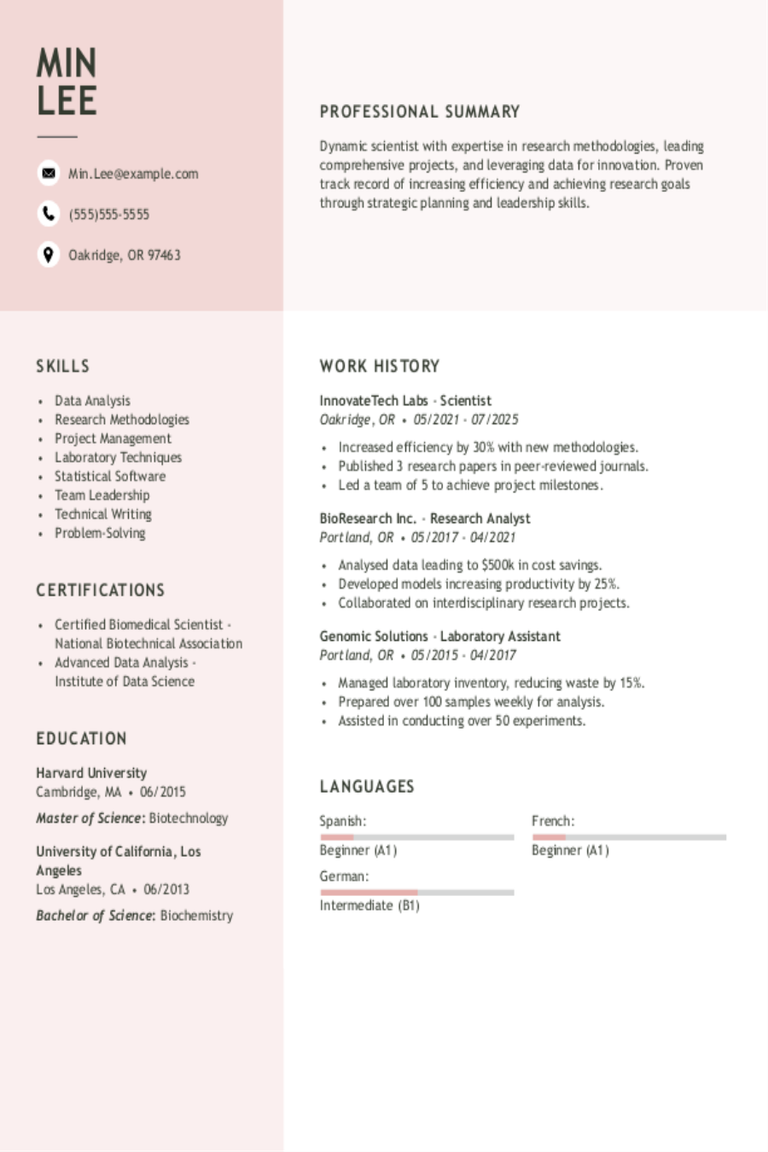
Sciences Resume Examples & Templates
Science resumes should show how you conduct experiments, analyze data, and solve problems. These examples help you highlight your curiosity and attention to detail without sounding too technical.Build my resumeImport
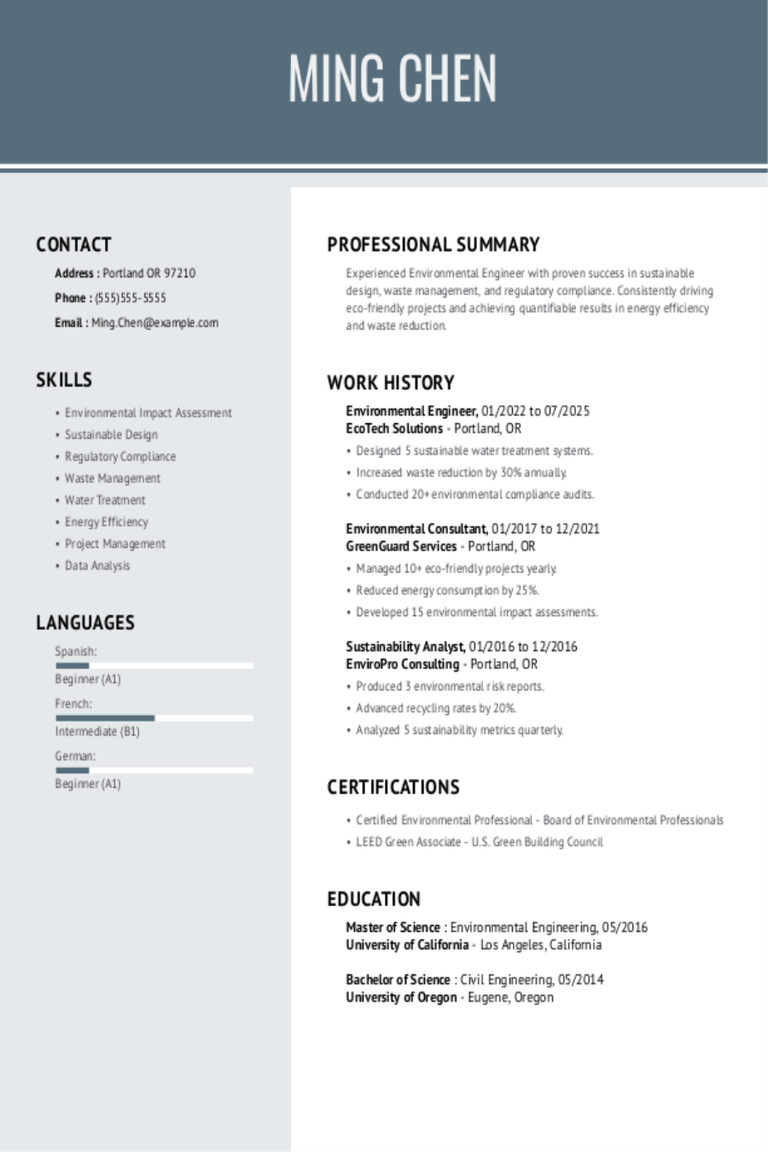
Environmental Engineer Resume Examples & Templates
Discover how environmental engineers showcase their ability to solve problems and protect the planet. These resume tips and examples will help you highlight your technical skills and project experience to
